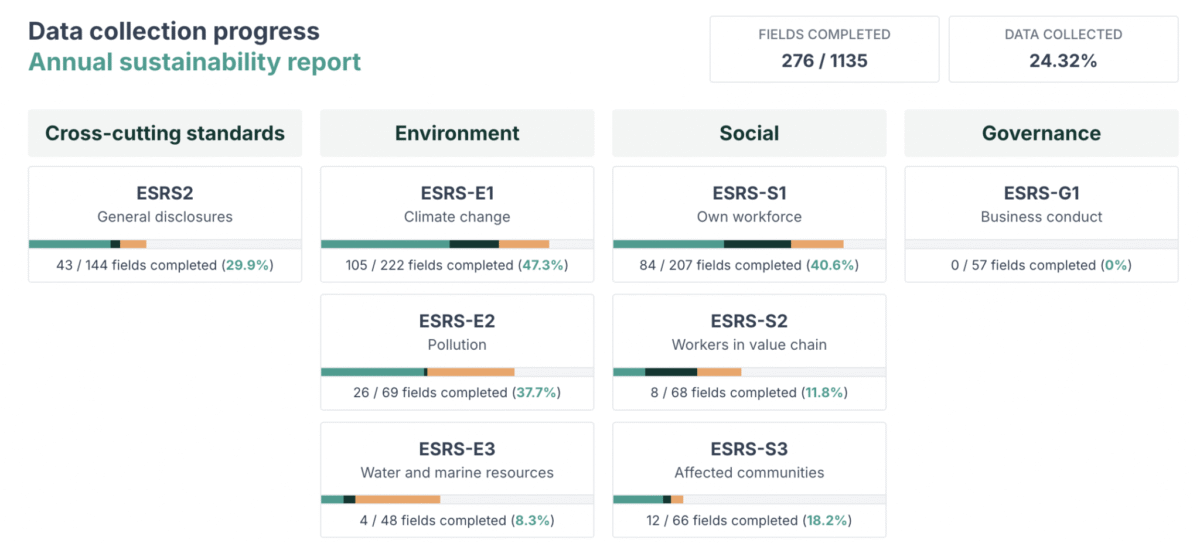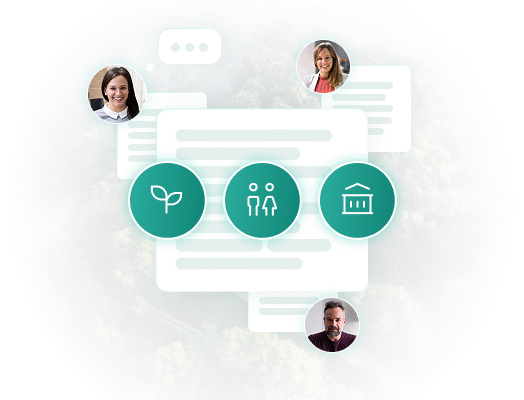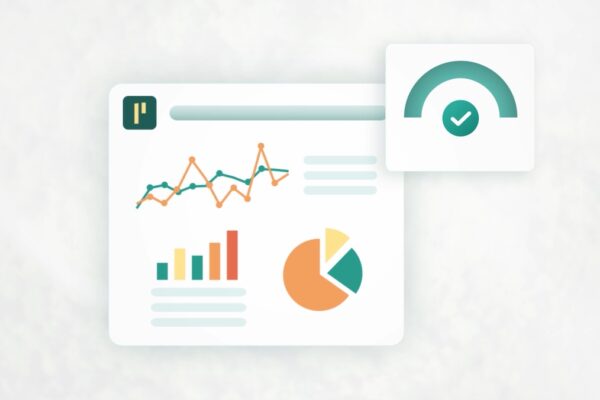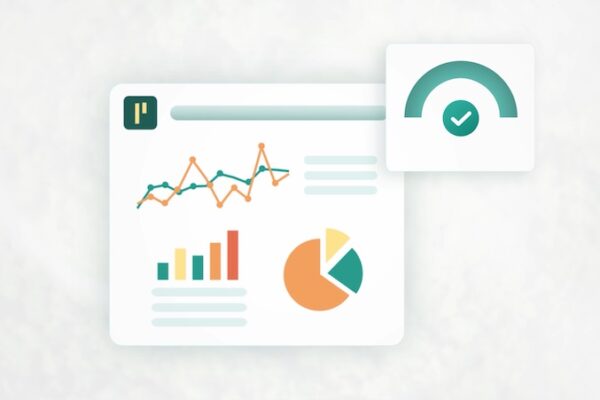Sustainability Data Management – Complexity Out, AI In
Sustainability data is more than numbers—it’s the foundation of credible ESG reporting, regulatory compliance, and strategic environmental planning. But let’s be honest: managing it is often a mess. Spreadsheets, siloed systems, manual processes, and late nights trying to consolidate hundreds of data points. Sound familiar?
It’s time to say goodbye to the chaos.
Welcome to the new era of AI-powered sustainability data management—where complexity is out, and intelligent automation is in.
What Is Sustainability Data Management?
Sustainability data management refers to the process of collecting, organizing, analyzing, and reporting environmental, social, and governance (ESG) data. This data includes everything from energy consumption and carbon emissions to workforce diversity and supply chain ethics.
When done right, it supports:
-
ESG reporting and audits
-
Internal sustainability performance monitoring
-
Regulatory compliance (like CSRD, SFDR, SEC)
-
Strategic decision-making
But as organisations scale, manual tools like Excel or disconnected platforms quickly become a liability.

Sustainability data management dashboard example
The Hidden Costs of Complex Sustainability Data Processes
Despite increasing pressure to report ESG data accurately and transparently, many companies are still stuck using spreadsheets, email threads, and disconnected tools to manage their sustainability information. On the surface, this may seem manageable—but the true cost lies beneath.
Inaccuracy: When data is manually entered across multiple files and platforms, human errors are inevitable. A missed decimal or outdated figure can cascade into flawed reports, putting credibility at risk.
Inefficiency: ESG teams often spend more time chasing data than analyzing it. Countless hours are lost to admin work—reformatting spreadsheets, sending follow-up emails, reconciling conflicting numbers—when that time could be used to drive real impact.
Lack of visibility: Decision-makers rely on ESG data to guide long-term strategy and risk mitigation. But when reports are compiled manually, data is often outdated by the time it reaches leadership, leaving them to make decisions in the dark.
Compliance risk: As regulations like CSRD tighten, the margin for error shrinks. Without an integrated system, it’s easy to miss reporting requirements or overlook necessary documentation—leading to compliance failures or even fines.
Even worse, the absence of a centralised sustainability data management system leads to fragmented tracking. Each department may use its own metrics, methods, and tools, resulting in inconsistent KPIs and incompatible datasets. Consolidating these inputs becomes a tedious, error-prone process that drains both time and morale.
Enter AI-Powered ESG Data Management: From Admin to Impact
Companies that adopt AI-powered ESG data management software report up to 80% time savings in the reporting process. Why? Because automation takes over the repetitive, manual tasks—like data collection, validation, and formatting—freeing up ESG teams to focus on what really matters.
Instead of chasing spreadsheets, sustainability professionals can:
-
Analyze trends and uncover risks before they become liabilities
-
Engage with stakeholders more effectively using real-time dashboards
-
Drive strategic improvements that align sustainability with financial performance
-
Explore predictive analytics, using AI to model the future impact of their decisions
Suddenly, sustainability reporting becomes a strategic asset—not a compliance burden. Teams have the bandwidth to move beyond reporting and into transforming business practices, helping the company operate more responsibly, efficiently, and competitively.
When you remove the friction from ESG data processes, you unlock the full potential of your sustainability function. And in today’s landscape, that’s not just a nice-to-have—it’s a competitive advantage.
AI to the Rescue: Simpler, Smarter, More Scalable
The solution? AI-powered sustainability data management software.
Artificial Intelligence is transforming the way organizations handle ESG and sustainability data:
Automated Data Collection
Ingest data automitcally from from your data sources.
Real-Time Analytics
Realtime dashboards that highlight where exactly are you going with your esg data.
Smart Validation
Let AI catch inconsistencies, detect outliers, and reduce the risk of human error.
Collaboration
Sustainability data has dozens of sources, in many corporates, data is in different countries and languages. AI solves all this. You may import all your sustainability data in Planmark tool from different countries and use different languages. Sustainability Data Management has never been so easy.
What Makes a Great Sustainability Data Management Solution?
If you’re evaluating tools (maybe comparing vendors), here’s what to look for:
-
Centralized Data Hub: One place for all sustainability-related metrics
-
AI Capabilities: From data mapping to predictive insights
-
Customizable Dashboards: So every department sees what matters
-
Regulatory Frameworks Built-In: Like CSRD, VSME
-
Security & Compliance: GDPR-compliant and secure by design
- Seamless collaboration functionalities that fit your corporate hierarchy.
Use Cases: How AI Improves Sustainability Data Management
Manufacturing & Energy
Track Scope 1–3 emissions, identify energy-saving opportunities, and meet CSRD reporting requirements with real-time alerts and benchmarks.
Real Estate & Construction
Monitor building performance, water usage, and tenant satisfaction— create reports for investors or EU Taxonomy compliance.
Retail & Supply Chain
Map out supplier ESG data, manage risk in sourcing, and reduce manual data collection from hundreds of vendors.
Why “Complexity Out” Is More Than a Slogan
It’s a shift in mindset.
You don’t need to fight your data. You need a smart system that works for you. With AI in the driver’s seat, sustainability teams can:
-
Focus on strategy, improvement and growth, not spreadsheets
-
Spend less time preparing reports and more time improving them (90% time savings in reporting)
-
Be confident in data accuracy when facing auditors or stakeholders
Is AI the Future of ESG and Sustainability Reporting?
Yes—but it’s already the present for industry leaders.
AI doesn’t replace your sustainability team—it empowers them. By taking over repetitive, error-prone tasks, AI lets experts focus on what really matters: improving performance, reducing impact, and meeting ambitious goals.
Planmark: The Simpler Way to Manage Sustainability Data
At Planmark, we believe sustainability data management shouldn’t be a bottleneck—it should be a competitive advantage. That’s why we’ve built a system that makes reporting:
-
Compliant by default
-
Smart by design
-
Simple by experience
Whether you’re preparing for CSRD, navigating ESG regulations, or just want to take control of your sustainability data, our AI-powered platform is here to help.
Next Steps: Ready to Replace Complexity with AI?
Let’s make your sustainability data work for you.
Request a demo or get in touch for a free consultation.
FAQs
What is sustainability data management software?
Software that helps organisations collect, manage, analyse, and report ESG and sustainability data, often including automation and AI features.
How does AI improve sustainability data management?
AI automates data collection, validates data accuracy, identifies anomalies, and even helps draft reports—saving time and reducing risk.
Is AI-based sustainability reporting compliant with CSRD and VSME?
Yes—many modern platforms include frameworks like CSRD and VSME natively, helping you align your data and reporting automatically.
How much time can AI save in sustainability reporting?
Organizations report saving 40–70% of the time typically spent on manual sustainability reporting when switching to AI-powered tools.


